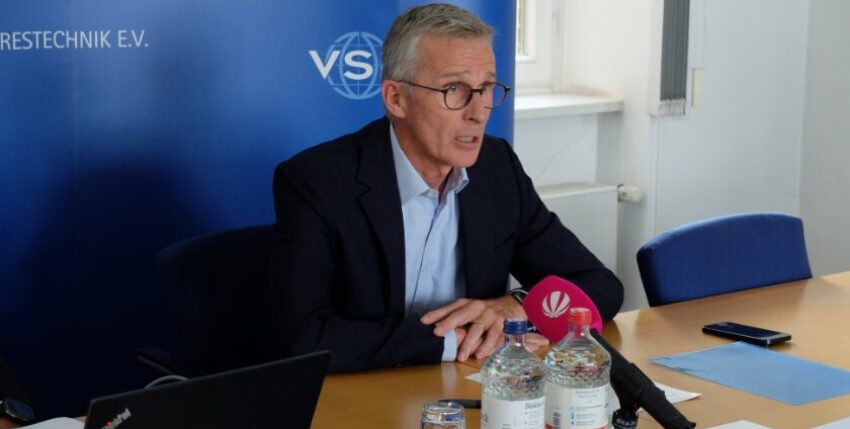Shipbuilding industry calls for industrial policy determination Brussels and Berlin
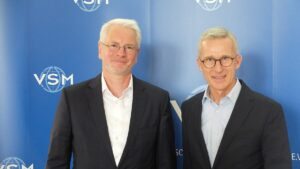
The VSM - Verband für Schiffbau und Meerestechnik e.V. (German Shipbuilding and Ocean Industries Association) hosted its annual press conference at the venerable Slomanhaus am Steinhöft in Hamburg. And the media came: it is clear that the maritime side of our lives in Germany is slowly being recognised. Too much has happened on the sea routes, but it has not yet reached everyone: Germany is a maritime-dependent nation. The VSM never tires of emphasising this. And so the VSM made an appeal to the European Union and the German government to present an industrial policy concept that would enable a return to the necessary growth and thus do justice to the strategic importance of the maritime industry, speaking on behalf of the German shipbuilding industry.
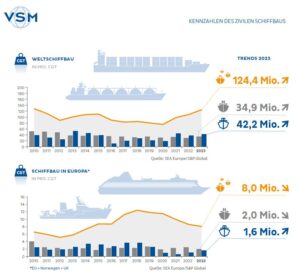 Jobs and billions in sales
Jobs and billions in sales
After the opening by the association's Managing Director, Dr Reinhard Lüken, the President, Harald Fassmer, spoke a few words of warning. He said that shipbuilding is more than just a technology sector. "We are talking about around 200,000 jobs with a total turnover in the region of 35 billion euros. For the offshore wind energy sector, another 10 billion euros would be added. This corresponds to a total of 1% of the German gross domestic product. In addition, most citizens of our country rarely or never come into contact with our products. This is also reflected in public discourse. On the other hand, awareness of the great strategic importance of the maritime industry has increased in recent years. He also referred to the importance of critical infrastructures such as submarine cables and internet connections. "We need to strengthen our maritime capabilities, our expertise and our capacities again, especially in shipbuilding," he emphasised. This is what we call a trend reversal. Just how serious the VSM is about analysing the industry can be seen in the VSM's usual annual report, which describes the industry's situation in great detail and reveals the association's activities.
Maritime industry is present throughout Germany
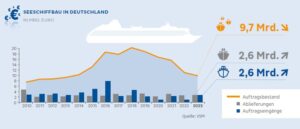 "Ships are among the most complex products made by human hands. The shipyard plays a central role as the organisation responsible for the overall construction project; this is where all those involved come together, where all the subsystems become a whole". In Germany, it is primarily ship types such as cruise ships that are built. There are hundreds of highly specialised suppliers for this. This includes much more than just the bridge and the main engine, ranging from life-saving appliances and fresh water generation to sewage treatment plants and galleys, from cabins to theatres. "The maritime industry in Germany comprises around 2,800 companies from Lake Constance to the Danish border. So shipbuilding is not a northern German issue, unfortunately this realisation is not very widespread, especially not south of the Main," said Harald Fassmer. Without an efficient supply industry, no ship can be built and shipbuilding has a national added value of 70%. "Last but not least, this year we are celebrating 50 years of the supply industry within the German Shipbuilding and Ocean Industries Association. The association itself is 140 years old this year."
"Ships are among the most complex products made by human hands. The shipyard plays a central role as the organisation responsible for the overall construction project; this is where all those involved come together, where all the subsystems become a whole". In Germany, it is primarily ship types such as cruise ships that are built. There are hundreds of highly specialised suppliers for this. This includes much more than just the bridge and the main engine, ranging from life-saving appliances and fresh water generation to sewage treatment plants and galleys, from cabins to theatres. "The maritime industry in Germany comprises around 2,800 companies from Lake Constance to the Danish border. So shipbuilding is not a northern German issue, unfortunately this realisation is not very widespread, especially not south of the Main," said Harald Fassmer. Without an efficient supply industry, no ship can be built and shipbuilding has a national added value of 70%. "Last but not least, this year we are celebrating 50 years of the supply industry within the German Shipbuilding and Ocean Industries Association. The association itself is 140 years old this year."
Light at the end of the tunnel
By this, the President meant that the situation was slowly being brought back under control, as the consequences of the pandemic, the war, supply chain disruption and inflationary pressure had left their mark. He regretted that ships were delivered that had been ordered before the pandemic and that the fixed price calculation was no longer correct after inflation. The past three years had taken a heavy toll on the industry's equity base. "There is light at the end of the tunnel because supply chains are becoming more stable again and new orders are coming in." Only the general conditions are politically unfavourable. The VSM has been calling for years for action to be taken against the distorted competitive conditions with the Far East. The shipbuilding industry is under considerable pressure. "The very liberal basic orientation of the European Union in particular has not yet provided any effective political answers," said the President. The Russian war of aggression and the Russian-Chinese "Partnership without Borders" have raised awareness of the dangers of strategic dependencies. Against this backdrop, the VSM welcomes the decision expected tomorrow from the Competitiveness Council on the need for a maritime industrial strategy for Europe. VSM President Harald Fassmer said: "We need a turnaround in shipbuilding policy. Maritime sovereignty cannot be ordered from China." With regard to the current Chinese export offensive, which car manufacturers in particular are moaning about, he said: "Welcome to my world."
Overdue maritime industrial strategy
On 24 May, the Council of Ministers will ask the European Commission to prepare a maritime industrial strategy. "From Maritime Actor to Maritime Power" is the title of a paper published in January 2023 by the analysis and research team at the General Secretariat of the EU Council, which describes the enormous strategic importance of the maritime dimension in detail and in many different ways. The document does not deal with the necessary industrial policy consequences. The European Commission last presented an industrial policy for the maritime industry in 2013. But the world has not been the same since then. The common European solution can only be created in the common European market. Around 10,000 seagoing vessels operate in Europe, with an additional 15,000 inland vessels. The EU plays a central role in the future of the maritime industry. Harald Fassmer ended his speech with a side-swipe at those "who want to abolish the EU", saying that he was in favour of a strong Europe on 9 June.
Utilising the strengths of the German shipbuilding industry
The industry is prepared to face up to the enormous challenges, to invest and to provide excellent training for skilled workers. However, it cannot do this alone. The German government has actively campaigned for the EU Council of Ministers to address this issue. However, it must now also fulfil this requirement with its own instruments. Germany continues to be home to numerous companies that set technological standards worldwide. Our maritime capabilities still give us all the options for action today. However, the decades-long erosion of assets must be reversed so that the location can preserve its maritime industry and thus its ability to act. Chief Executive Dr Reinhard Lüken said: "The German government has understood the pressure to act and has responded to the European Commission's inaction in recent years. But this can only be the starting signal. From now on, we need to roll up our sleeves and take new steps towards real maritime sovereignty."
The boom is bypassing Europe
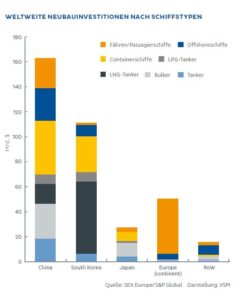 Dr Reinhard Lüken used several charts to explain the situation in the shipbuilding industry. He said that the boom of the last 3 years had largely bypassed Europe. The European market share of global newbuildings is just 3.8%. While global shipbuilding is on the upswing, Europe has fallen behind. He compared the incoming orders with each other and referred to China, which had grown enormously since the coronavirus pandemic. The Chinese have now booked orders worth around 60 billion dollars, while Europe as a whole has just 8 billion. There is only Korea left to counter the Chinese pressure. But even in 2023, Korea only managed 30bn. With regard to the ships built, he pointed to the imbalance in production. Europe's strength lies in the construction of cruise ships. "We need to generate more growth again," he said. Europe's focus on the high-end markets was certainly important from an ecological point of view, as 10 years of shipping crisis have not caused too much damage in Europe because we have successfully produced in niches. "But since the pandemic, we have realised that this strategy also has its weaknesses." Strategically, this decision was not a good one.
Dr Reinhard Lüken used several charts to explain the situation in the shipbuilding industry. He said that the boom of the last 3 years had largely bypassed Europe. The European market share of global newbuildings is just 3.8%. While global shipbuilding is on the upswing, Europe has fallen behind. He compared the incoming orders with each other and referred to China, which had grown enormously since the coronavirus pandemic. The Chinese have now booked orders worth around 60 billion dollars, while Europe as a whole has just 8 billion. There is only Korea left to counter the Chinese pressure. But even in 2023, Korea only managed 30bn. With regard to the ships built, he pointed to the imbalance in production. Europe's strength lies in the construction of cruise ships. "We need to generate more growth again," he said. Europe's focus on the high-end markets was certainly important from an ecological point of view, as 10 years of shipping crisis have not caused too much damage in Europe because we have successfully produced in niches. "But since the pandemic, we have realised that this strategy also has its weaknesses." Strategically, this decision was not a good one.
The trend must be reversed, he said, referring to five points:
- Do not weaken the civilian portfolio
- Offshore vessels and platforms
- Sustainable ships for European service
- Marine shipbuilding
- "new markets"
Another major topic is the politically decided and irreversible offshore market, wind energy and its expansion targets, which not only Germany but the whole of Europe has set itself. "This is a huge market that we will also serve in Germany. Converter platform is certainly the most prominent keyword. We believe that we have a lot of catching up to do in the area of sustainability. We have a huge domestic market." Says Lüken.
Regarding the Green Deal, Lüken said: "We need the framework conditions that enable capacity building - the industry is pushing ahead with investment, training and education.
Above all, this very important market segment of the cruise industry, which is very important for the European market, is clearly back. When asked about the cruise ship segment, Lüken said, "We must not weaken these segments, which have made our success possible in the first place." The booking figures are high, the boom times above those before corona. And customer interest in ordering is clearly very lively again.
When asked about naval shipbuilding, Lüken said: "I think the navy itself is disappointed with the way the special fund was spent. The navy has not really benefited. And when asked about the Warnowwerft naval arsenal, Dr Lüken said that the association was "not necessarily happy" about it. He expressly welcomed the navy's plans to sail in the Pacific region, saying that it was also a good idea from an industrial point of view to have a presence there.
Text/Photos: hsc
Tables: VSM

